7 Reasons Why Marvel Superhero Movies Are Really Boring
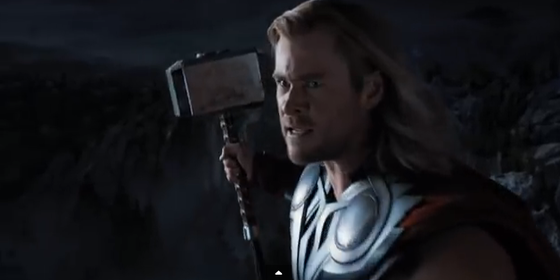 |
| Thor doesn’t like what you’re about to say. |
The small popcorn is long gone. The soft drink cradled in the side of a massive movie theater seat is watered down. The movie drags, but you can’t sleep through it if you tried. A nap would be too quickly disturbed by the gunfire and explosions that bombard the audience scene after plodding scene.
It’s another Marvel superhero movie. You’re not sure why you are here.
Larger-than-life figures from the comic books that you, your parents and, maybe, your parents’ parents, read are fighting an enemy. The identity of said enemy is now irrelevant. You’re focusing on the details, minutiae that normally wouldn’t catch your attention. Are these costumes historically accurate? Is this character’s story historically accurate? You’re counting minutes until the credits roll. You go home, check Twitter and Facebook. You are officially the only person you know who thinks the latest big budget faboy/girl fest is an overrated bore. You have lost every single geek point earned during those years of encounters with middle school bullies. You are a contrarian. A stupid hipster. Possibly a jackass. You are over superhero movies.
Superhero movies are the pits. Sure, there are a few exceptions, most of which involve Batman. By and large, though, these blockbusters-by-design retread every tired movie cliche of the 20th century and a few more modern ones. Some are downright terrible, which is almost admirable in a way. At least a real crapfest can be improved with the right group of Statlers and Waldorfs. Instead, it’s the middle-of-the-road ones that earn your scorn. They aren’t technically bad; they just aren’t interesting. They’re the cinematic equivalent of Maroon 5. Hopelessly ordinary. You would expect more from someone dodging explosions in a ridiculous get-up. That’s why your annoyance with Marvel character-driven flicks is so much stronger. DC character movies are so inconsistent that they still hold a little mystery. You could get The Dark Knight or Green Lantern. Either way, you’ll walk out of the theater saying something other than, “Yeah, it was alright. I suppose.”
Still, superheroes draw lines of movie-goers. People cheer as the theater darkens. There’s actual crowd approval before the movie starts. And you, you dear reader, are shunned because you dared to walk out of theater with the belief that Captain America: The Winter Soldier is not the best thing since The Avengers, which is not the best thing since whatever. Here are the reasons why you are right.
1. Superheroes Already Have Fans. The Studios Don’t Have to Try Hard to Get Attention.
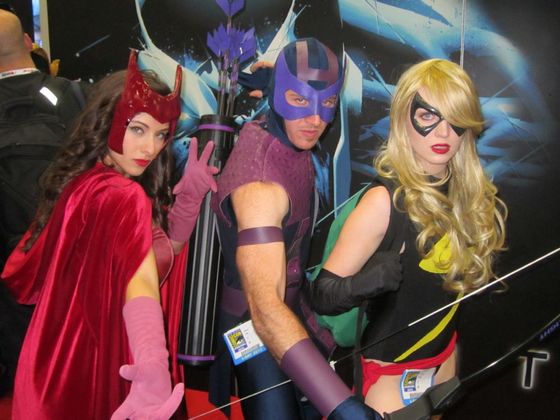 |
| Liz Ohanesian for L.A. Weekly |
| Superhero fans will exist with or without movies. |
Superhero movies aren’t a hard sell. We know the characters. We know a lot of the major stories. The infrastructure to promote the film is there. You can get a few sneak peek photos out to entertainment news sites, continue to build the hype at San Diego Comic-Con and let the longtime fans of the characters take care of the rest. At this point in time, there have been enough stellar comic book movies to convince jaded fans to give it a shot. As long as you don’t make an abomination, people will come back. Actually, even the worst movies have hope. There are always reboots. The fans will probably give the franchise another shot or three.
Of course, this only works for long-established franchises. With less mainstream source material, there’s a bit of an uphill battle. You do have to turn out a stellar product and you do have to make every effort to try and reach a potential audience. Even if you do that, there are no guarantees. See Scott Pilgrim vs. The World, which was far more deserving of box-office gold than anything with the Marvel tag.
The closest parallel is in music. There are bands who have been around longer than plenty of their fans have been alive. Maybe they’ve gone decades without releasing a worthwhile album, or any album, but they’ll still play live. When they play, crowds will appear and they will scream and dance because the bands play the songs that they know and love. I’m one of those fans. I haven’t liked a Cure record since 1992, but that hasn’t stopped me from going to see them live.
When you’re already a fan of something, you’ll give the new product or event a shot because there will be something you like about it, whether it’s nostalgia or even a new aspect that you find appealing. The people creating the content don’t need to try that hard to get you there. That’s the job of the marketing folks – the real heroes of this genre.
2. They’re Repetitive and Hype-Driven.
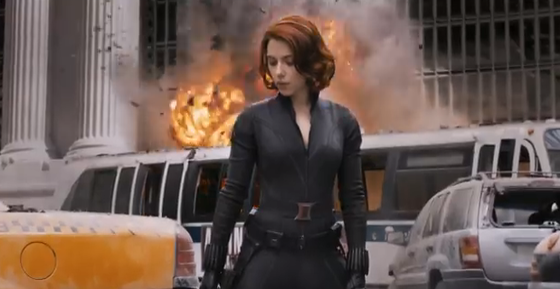 |
| So, are we getting a Black Widow movie? |
There’s a thing called “Marvel fatigue” that Kenneth Turan discusses in his Los Angeles Times review of Captain America: The Winter Soldier. This is a very real thing. I have it. Maybe you have it too. Maybe you’re in denial that you have it, so you wrote an angry response to every naysayer out there, even though the critical headline was followed by a story that was totally tl;dr.
The Marvel Cinematic Universe movies are the worst offenders in the hype-driven repetition of superhero movies. You go in knowing that you’re going to get at least two hours of mumble-mumble-boom-mumble-mumble-bang-mumble-mumble-crash. Nerd jokes will be followed by a pregnant round of gunfire. It’s not just the Stan Lee cameos that leave you with d?j? vu; it’s the whole damn thing.
The worst part is the interconnectedness of the movies. From a marketing perspective, this is a genius move. It’s non-stop promotion. For an audience member who isn’t hardcore Marvel, but does like a good movie, it’s tedious. Instead of sitting down and watching a movie, you’re trapped in a 2 hour-plus commercial for the next wad of cash you’ll drop at the theater.
3. The Characters Trump the Director.
Despite the big budgets, studios aren’t going to take any major risks with superhero movies, particularly if their franchises are doing well. The directors tend to be established, whether that’s in film or with an acclaimed television show. This isn’t going to be their star-making gig the way that writing or drawing a major superhero comic has been for plenty of people. (Of course, this is different for the actors; note Tom Hiddleston’s star turn as Loki.) Most aren’t as easily associated with a director as, for example, Hellboy is distinctively a Guillermo del Toro movie and Batman Returns is obviously Tim Burton’s stab at a famed franchise.
That’s antithetical to the evolution of comic books over the decades. If you’re a longtime reader, you know how comics change with their creative teams. You get to understand the nuances of a character’s look in the hands of different artists. You probably have your favorite writers. The best writers and artists catapult characters out of obscurity or make forgotten heroes relevant again (see Ed Brubaker and Captain America). They take the big guns and give them stories that transcend even their own legends. With the Marvel character movies (and this is not exclusive to the Cinematic Universe films), the obvious goal is to just keep the franchises steadily moving. For the love of Odin, can’t someone go in and shake things up a bit?
4. They’re Riding the Line Between Meta Humor and Pandering.
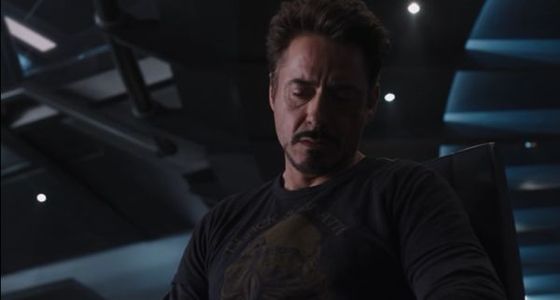 |
| Hey, Iron Man is wearing a Black Sabbath shirt! I get that! |
Is there a line between smart, referential humor and simply pandering to the fans? Yes , there is, and some superhero movies come really close to crossing it.
Admittedly, I’m not the biggest fan of superhero comics. They didn’t resonate with me the same way Sandman or Love and Rockets did. Still, I genuinely like the genre and have read, and enjoyed, a lot of superhero comics, or, at least, enough to catch in-jokes and other assorted fan references.
Sometimes, the best and worst thing about a superhero movie is the meta humor. Take The Avengers as an example. Tony Stark in a Black Sabbath shirt is pretty sweet. Hell, the bulk of what comes out of Tony Stark’s mouth is gold. As far as heroes go, I have an affinity for Iron Man, at least when the role is in the hands of Robert Downey, Jr. He brings a hyper self-awareness to the character and somehow manages to be both smug and charming. But, let’s get back to the point. Sometimes, you can get too much of a good thing.
Referential jokes can be great. They can help suck the audience into a world that doesn’t look or feel like our own. They can also cover up holes in the story, distract the crowd from the character who is just standing in a corner with a bow and arrow and nothing to do. If you’re making a superhero movie, you don’t need to prove you’re hip with the geeks. However, people do that over and over again. They become the teacher who goes out of the way to relate to the kids, but forgets to actually teach the class.
5. They Are All About the Spoilers.
Opening weekend of the latest superhero smash hit, you head to Twitter and count the raves written in bloated, yet non-descriptive language. You know that about 99.9% of the people you follow say that this thing is “awesome” or some other synonym for the word, but you don’t know why. Nobody wants to come close to mentioning what happens because spoilers lose friends, or something like that.
There was actually a study from the University of California San Diego arguing that spoilers don’t hurt the story. With superhero flicks, though, spoilers are what matter. In these movies, the big reveals are the draw. You watch the trailers and you know that something dramatic is going to happen. You go to the theater because you want to find out what that something is.
There’s more to movies than plot twists. One of the biggest movie bombshells came in Empire Strikes Back. It doesn’t simply change the direction of the movie. Rather, it changes the entire franchise. We’re no longer watching a good guy/bad guy battle. We’re watching the clash between father and son. That brings up a whole load of other questions. How did Vader end up on the dark side? Will Luke Skywalker follow his father or defeat him? If the answer is the latter, will he feel guilt if he wins? Decades later, the identity of Luke Skywalker’s father is no secret. You can know the spoiler before you see the movie and it won’t ruin the experience. The spoiler is only part of a much bigger story.
The same could hold true for Game of Thrones. If you read the Song of Ice and Fire books, you know who dies up to a certain point. Those are pretty big spoilers. Every major death sets off a new chain of events that further alters the story. However, it doesn’t necessarily change the experience of watching the show. George R.R. Martin created a massive, intricate world and there’s a lot to absorb, whether or not you know who dies in the next few seasons.
Comic books are similar. There are decades of characters whose fictional lives have been profoundly changed by the number of writers who have become involved with them. There’s such a wealth of material, that it’s sad to see setup, battle, reveal, repeat. Sorry, did that need a spoiler alert?
6. Gratuitous Violence Unfolds in the Safest Way Possible.
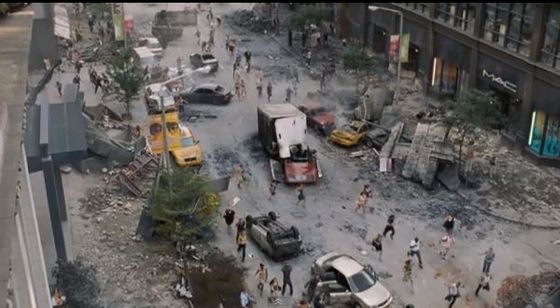 |
You’re probably not going to see nudity in superhero movies. You won’t hear much profanity either. The violence, however, can be gratuitous. That’s normal for the genre. Nude scenes and f-bombs simply aren’t as common as Kapow! moments in superhero comics. But there’s a difference in the treatment of violence in superhero movies and in superhero comics.
In superhero movies, the explosions might roll one after the other. The gunfire might be loud enough to startle even an attentive member of the audience. In the aftermath, there are wrecked cars and leveled buildings and maybe even armies of people on the ground. You might even seen a few of the stars with cuts and scrapes on their faces. Maybe there’s an injury, possibly a serious one, but there’s still a safe distance between the consequences of violence and the audience. In other words, you probably won’t cringe during the movies.
Violence can be artful. It can be used to make a strong point. This violence, though, is so sanitized, that the impact is lost. It’s filler meant to appease a society that prefers guns to boobs.
That’s not always the case in comics. Even in “The Winter Soldier” arc of Captain America, the battlefield flashback art is brutal. There are gruesome details inside those panels and clear messages about the cost of war, not just in lives lost, but in memories that haunt the survivors. In comics, violence does come with consequence. People who matter to the story do die. Those who survive may do so with an injury that lasts until the franchise gets a reboot. In comics, violence is more than a means to an end. In comic book movies, fights and explosions are just another way to get the crowd rooting for the hero.
Really smutty Loki fan fiction is more entertaining than this.
7. When There’s a Political Theme, They Will Hit You Over the Head With It.
Superheroes can certainly tackle the socio-political messages of the day. We’ve seen that consistently over decades with most of the characters who have become household names. Certainly, this is part of the cultural stickiness of the genre. These bold characters can morph over time to reflect changes in society.
When I read the trade hardback of Captain American: The Winter Soldier, the things that stuck out were the comments on war. It’s not pro or anti anything. The message isn’t that explicit, but it’s in the art and in the story, that war has consequences on individuals that last long after the fighting stops. This is incorporated in the movie as well.
In the movie, though, there’s this perceived message about freedom and fear that’s been seen as a strong point in plenty of reviews. Steve Rogers says, “This isn’t freedom. This is fear.” People act like it’s the most poignant phrase uttered on screen since since “the Jungian thing” in Full Metal Jacket. Freedom and fear aren’t themes. They are words that characters say at critical moments of the movie with all of the seriousness of cable news talking heads vying for your attention, because, you know, relevance.
Previously by Liz Ohanesian
